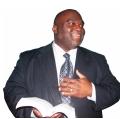 Deacon Harold Burke-Sivers
Deacon Harold Burke-Sivers
Portland Oregon
A pirate, a vampire, and Cyclops from the X-Men. These are a few of my favorite costumes I wore as a kid on Halloween.
Halloween has experienced an increasingly virulent “love-hate” relationship among Catholics over the past decade or so, particularly since the advent of the Harry Potter phenomenon. Judging from the plethora of articles and blogs on the topic, Catholics seem to be divided into two camps. The first says, “Reject Halloween at all costs since it is the devil’s holiday and only serves the corrupt the hearts and minds of our children.” The second says, “Oh, come on! What’s the big deal? There’s nothing wrong with kids playing ‘make believe,’ having fun and getting candy. It’s not like they think Halloween is for real.”
I believe this time of year presents our children with a tremendous faith-learning opportunity where the emphasis should be not on Halloween itself but on the Feast of All Saints. They need to know the history of All Saints, its tacit connection to Halloween, and how it has become distorted by the secular culture.
In a nutshell, the Feast of All Saints was established shortly after the implementation of religious pluralism in the early 4th century. During this time, Christians desired to formally honor the martyrs who gave their lives for the faith, and the Feast of All Saints was established and celebrated on May 13th. In the year 844, Pope Gregory IV moved the Feast of All Saints from May 13th to November 1st, where it remains to this day.
This is where the connection to Halloween comes in. “November 1st marked Samhain, the beginning of the Celtic winter. Samhain was the Celtic lord of death, and his name literally meant ‘summer’s end.’ Since winter is the season of cold, darkness and death, the Celts soon made the connection with human death. The eve of Samhain, October 31st, was a time of Celtic pagan sacrifice, and [the Celts believed that] Samhain allowed the souls of the dead to return to their earthly homes that evening. Ghosts, witches, goblins, and elves came to harm the people, particularly those who had inflicted harm on them in this life. […] To protect themselves from marauding evil spirits on the eve of Samhain … the Druids (the priests and spiritual teachers of the Celts) built a huge new year’s bonfire [and] offered burnt sacrifices [of] crops, animals, even humans. People sometimes wore costumes of animal heads and skins” (Reverend William Saunders, “All Saints and All Souls,” Arlington Catholic Herald, 2002).
Despite the spread of Christianity throughout the known world, the collective memory of some of these Celtic customs remained. Hence, the Christian Vigil for the Feast of All Saints, or All Hallows Eve celebrated on October 31st, became Halloween. Instead of observing the Christian custom of remembering deceased loved ones in a special way, the culture exploited elements of pagan rituals and practices, creating a pseudo-holiday. Nevertheless, it is clear that All Saints day evolved out of a purely Christian ethos and not from pagan idolatry.
Then what should we do about the kiddos? To what extent and level parents choose to inculcate Halloween into the lives of their children is a prudential decision. However, Halloween presents a wonderful opportunity to help children not only appreciate the true significance of this time of year, and to remember and honor those who have gone before us marked with the sign of faith (i.e., baptism) but also challenge them to become saints in their own lives!
In order to become saints, we don’t need to be great theologians like Saints Augustine or Thomas Aquinas. We don’t need to be martyrs like Saints Felicity and Perpetua. We don’t even need to perform great works of charity like Mother Theresa or Martin de Porres. In order to become saints, we must allow ourselves to be totally consumed by the fire of God’s absolute love. We become saints by fulfilling Christ’s command to love the Lord Our God with our whole heart, with our whole soul, with all our mind, and with all our strength.
The bottom line is this: we are responsible and will be held accountable for teaching our children the faith and helping them to fall ever more deeply in love with Jesus. In our love of God and neighbor we too become saints, which should cause us to rejoice and be glad, for our reward will be great in heaven.
Psalm 104:1,
Deacon Harold
Disclaimer: Articles featured on Oregon Report are the creation, responsibility and opinion of the authoring individual or organization which is featured at the top of every article.

